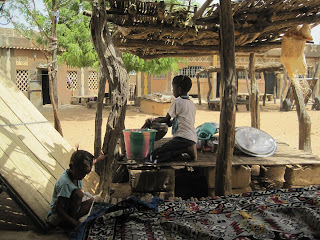Just got back to Thies after 10 more days in Ngeexoox (which is spelled Nguekhokhe in French if you’ve been wondering why it’s not on Google maps...) and first off, thanks for all the love! Got my first package from my parents supplying me with Economists to catch up on and other treats, as well as some letters and cards from some lovely people :) Keep them coming! (I will return the love with some cool Senegalese stamps attached!) But if you’re looking to send me something, now is probably the time to redirect it to my permanent address:
B.P. 181
Ourossogui
Senegal
West Africa
Keep in mind it will take much longer to get to the North, possibly up to a month. I’ll be able to grab mail from Ouro Sogui once I install at site in just 3 weeks.
As I’ve really done nothing more than immerse myself in Pulaar at training site (and I’m finally understanding what people say to me!), I guess I’ll explain some daily life/logistic type things in this post.
Each morning I wake up and head to the washing area to shower.. From a bucket. There is usually only one source of running water per compound, if that, so to bathe I have to fill up my bucket at the spigot and take it over to the washing room. The most annoying part is washing my hair, which always takes forever. One of the girls in my stage has already shaved her head, and I’m really jealous every time I have to wash my hair. Other than that it’s really not so bad, and yay, I’m saving water!
The general communication that I have mastered is the greeting, which looks a little like this:
No mbad-daa? [How’s it going?]
Jam tam. [Peace only.]
Ada selli? [Are you healthy?]
Mawdum. [Good.]
No mbadu-daa e tempere? [How are you doing with the tiredness?]
Ko mawdum. [It’s good.]
No galle ma wadi? [How is your house/family?]
Ebe e jam. [They are in peace.]
Greeting is incredibly important in Senegalese society. The funny thing is, you ask it more of a formality, rather than for actual information on the persons well-being. It’s a bit of a spit-fire interaction of the key greeting buzzwords. As long as you’re saying one of the greetings, you’re good. Often people respond to my “No mbad-daa?” with “Ada selli?”
Another big part of Senegalese society is attaya, which is tea. They make their tea in a very specific manner. The tea itself is just black tea imported from China (they try to claim this as their own, but I can read the box). They brew it on a little charcoal stove and add a lot of sugar and some fresh mint to finish off the concoction. The next part is the most characteristic, the pouring of the tea. This practice is generally to cool the tea off to make it a drinkable temperature, but also involves a bit of skill. Essentially, you pour the tea into glasses just about the size of a double shot glass and pour it back and forth between two or three glasses. While pouring (some show off and pour it from high distances) you create a foamy top (so the glass is half tea, half foam) and the more foam you can make, the better/cooler you are. Generally the men make attaya, but I’ve tried a few times and the pouring is a lot harder than it seems. My family doesn’t drink it that often, but many families drink it after lunch and sometimes dinner. It is also the go-to activity if you have guests.
Other things that are new in my daily life:
I filter my water with a charcoal filter (provided by PC) and add 3 drops of bleach per liter after filtering. Sometimes I forget the bleach, but the charcoal filter purifies of everything but amoebas... so keeping my fingers crossed (and training my stomach). I’ve had my first bought of mild stomach issues this past home-stay, not fun at all, but I can pretty much pin-point the cause to random garage food I ate, so now I’m just being a bit more careful about where I buy my food from (though really, having some stomach issues is unavoidable here).
I sleep under a mosquito net every night, which I am religious about not only to avoid malaria, but because it is the perfect security screen from anything that may possibly get at me at night. I’ve heard of mosquito nets as (at least preliminary) safeguards from scorpions, snakes and mice, all of which are things I’d like to avoid getting waken up by.
Other than that, I’ve been doing quite a bit of reading and sitting. Not to generalize, but the Senegalese love sitting! And they love asking you what you’re doing when you’re obviously doing it... “Are you sitting?” is a common question. As annoying as these type of questions are, they are a nice reinforcement of my limited Pulaar.
I did go to Saly recently, a toursity beach resort area mostly visited by European tourists. It honestly reminded me of the waterfront cafes in Nafplio, Greece. In other words, if you’re looking for a beach getaway, come visit me here! It’s gorgeous.
Pictures coming soon, internet permitting.



















